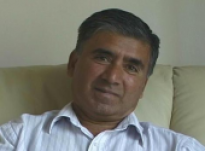Khadim - Interview 38

More about me...
When Khadim first developed a tremor in one hand he had recently been made redundant and was therefore willing to accept his doctor’s suggestion that his symptoms were caused by nerves. However when two kinds of medication had failed to help he was referred to a neurologist. Here, though the Parkinson’s disease was diagnosed and he was put on anti-Parkinson’s medication there was still very little improvement. Over the next few years he became increasingly disabled until finally he was referred for Deep Brain Stimulation. Although he was warned of the possible risks from this operation, and he was worried- not so much about dying but about possible brain damage- he was eager to go ahead with the operation. He was given a date several months away. The operation took place in January 2008. The result has been almost complete disappearance of his symptoms. He still has some tremor which is controlled by Sinemet. If the dose of this is too high he experiences uncontrolled movements in his legs.
Khadim lives in an area with a quite large Pakistani community but has never come across anyone else with Parksinson’s disease. He has felt it necessary to say that he suffers from a disorder of his nerves as he feels people will not understand what is meant by Parkinson’s disease.
Khadim describes how the doctors looking after him decided to offer him the DBS operation.
Khadim describes how the doctors looking after him decided to offer him the DBS operation.
Khadim describes what he felt at the prospect that he might not survive the operation.
Khadim describes what he felt at the prospect that he might not survive the operation.
Khadim remembers the surgeons adjusting the position of the electrodes during the operation.
Khadim remembers the surgeons adjusting the position of the electrodes during the operation.
Khadim explains how he tried to deal with his embarrassment when he felt his symptoms were being observed.
Khadim explains how he tried to deal with his embarrassment when he felt his symptoms were being observed.
Khadim applied for work but realised he was turned down because his tremor had been noticed.
Khadim applied for work but realised he was turned down because his tremor had been noticed.
Khadim was very interested by a television programme about Mohammed Ali and another about a British journalist who had surgery.
Khadim was very interested by a television programme about Mohammed Ali and another about a British journalist who had surgery.
Khadim plans to travel to the Middle East and is slightly concerned about how people there will react to the pulse generator embedded in his chest wall.
Khadim plans to travel to the Middle East and is slightly concerned about how people there will react to the pulse generator embedded in his chest wall.
I’m travelling next month to the Damascus and Saudi Arabia my family and I’ll show them the letter and if they don’t, you know, I’ve got an actual letter from hospital, and a drawing, and a card.
And the battery to show them.
Yeah, yeah and, I hopefully they, well these days are very, very careful. The bomb or gun or something like that, you know, but, that’s it meant to be seen that’s my first experience when I go abroad I’ll see what they, I mean British Airports no problem they know, there is something called Parkinson’s Disease, there is something called operations, stimulators, things like that, you know? But foreign countries don’t know that do they? So, you know, they, they’re a little bit iffy.

